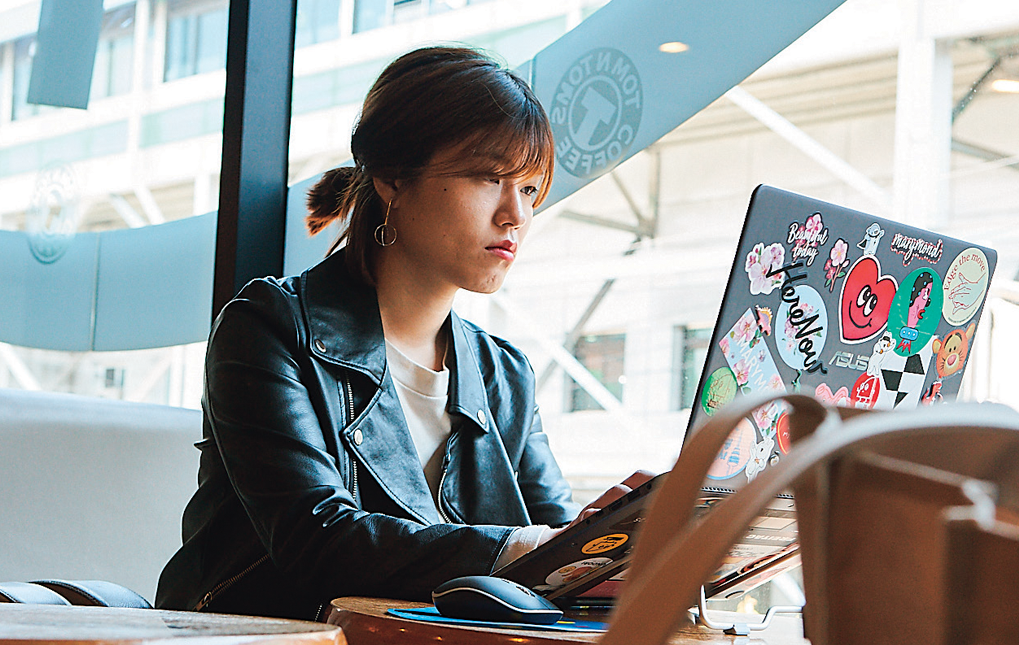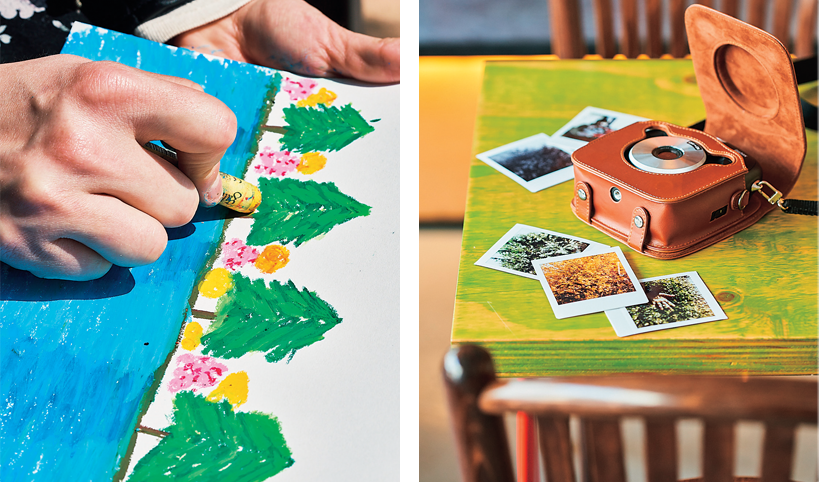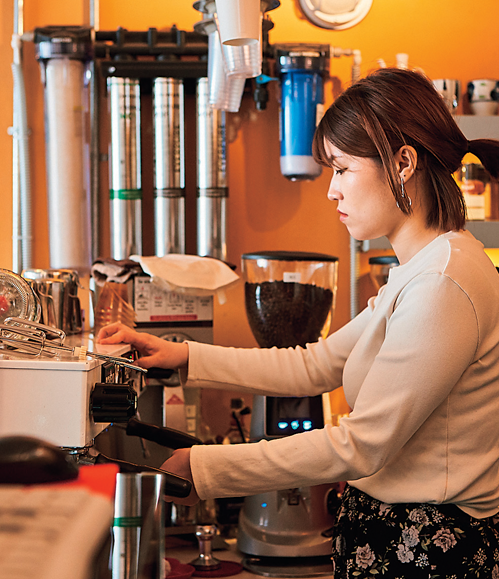For Korea’s older, work-first generation, making sacrifices for one’s future happiness was more important than the present. But today’s younger generation prioritizes tangible happiness in the now, ahead of an uncertain future. That’s how Yang Hye-eun plans her day as she prepares to start her career.
Koreans in their twenties are being called the “Give Up 3 Generation.” The moniker, a nod to giving up on dating, marriage and having children, surfaced in 2011. Since then, it has reformulated into “Give Up 5,” “Give Up 7” and “Give Up N” generations, the latter being an infinite number of self-denials.
Older generations, who d the postwar “Miracle on the Han River” with the motto, “If you do it, you’ll make it,” scoff at how traditional milestones in life are being bypassed. But when they were in their 20s, the economy was roaring, landing a job was easy, as was dreaming of a better future. In the past dozen years, however, the labor market has been especially brutal for young adults. Even after years of study to obtain a university degree and certifications for special skills, well-paying full-time jobs remain elusive. Laying a foundation for the future seems to have become a privilege for all but a lucky few.

Yang Hye-eun works on scripts for a Korean language textbook at a café in Hwayang-dong, Seoul. She says she can concentrate on her work better in a café than at home.
Journey Toward a Goal
Now in her mid-twenties, Yang Hye-eun is preparing herself for the time when the right job might come along.
“Older people say lots of not very nice things about my generation, but to be honest, we’re not all that interested in what they say. We’re just too busy to care,” she says.
After graduating from university, Hye-eun worked full-time at a start-up and was recognized for her abilities. But she quit after a year, leaving an atmosphere of “just get things done whichever way you think is best.” She wanted an occupation with better structure while still acknowledging her creativity.
During her search for the right fit, Hye-eun has taken on various jobs, including tutoring and volunteering as a gallery docent. There is no real break. She works every day to afford life in Seoul, where living costs are high. She works at a café on weekends. Then she switches to proofreading Korean textbooks that will be used in the United States. “Technically, it’s called ‘working from home’ but I usually work in a café on my laptop,” she says. “I listen to a Korean language recording and make sure it matches the script, editing and filling in any typos or missing words.”
Hye-eun hopes to join a company that meshes with her ultimate goals in life. “I want to be someone who benefits society by conveying beauty with creative work, someone who can give children or those with difficult home lives a sense of freedom through public, non-profit arts activities.”
To that end, she writes, draws and takes photographs every day. Perhaps her own experience explains why one of her goals is to help people with challenging home lives.
Hye-eun grew up in an ordinary middle-class household on Jeju Island. Her father was a bank clerk, her mother a homemaker, and her grandfather a landowner. But her father compiled massive debts by gambling and standing surety for other people’s debts. Hye-eun’s grandfather ended up losing all of his land and fields, and a few months after fainting from the shock of it all, he passed away. Fights between her parents gradually intensified, and they divorced. Hye-eun, in the second year of middle school, was shuttled back and forth between her parents.
Without her parents together, Hye-eun depended on her many relatives and learned how to navigate the complexities of life. There is a saying that people have nine different faces. And she learned that people indeed have many sides to them.
Wanting to leave Jeju, Hye-eun set her sights on attending college in Seoul. Her parents strongly opposed the move, but her two older sisters actively supported her. With their encouragement she was able to get a full scholarship to study Korean language and literature at Hanyang University.
Moving to Seoul
“After my parents divorced, I reckoned there was no longer any protective fence around me, and so I lived very independently,” she recalls. “But then, when I was living in a tiny gosiwon trying to keep up with my studies as well as a part-time job, it was just too much. During my very first semester, there were many times when I would go out into the alley to phone my sister and just cry.”
Gosiwon probably are the cheapest form of housing in Korea. Rooms of about 5 square meters are packed along narrow corridors, separated by walls so thin there is no real privacy.
“From the second semester onwards, I didn’t cry,” she says. “I liked that my campus was big and spread out, I enjoyed learning, and by then I had made friends who became like my family. The city of Seoul and the diversity among people who live here felt fresh and exciting to me.”
Hye-eun’s day begins at 8 a.m. or around 11 a.m. It depends on when she plans to go out. After a breakfast of toast or eggs, she stuffs her laptop, sketchbook and camera into her bag and sets out for the place decided upon the night before. Her favorite destinations for photographing and making notes include wholesale fruit markets and alleyways of a traditional medicine market as well as galleries, libraries and parks. After that she goes to a café for an iced coffee and a croissant or madeleine; she spends about four hours there “working from home,” before actually returning home.
A simple dinner is followed with sketching or writing and watching a movie or reading before going to sleep, usually around 4 a.m. New to the routine are hour-long swimming lessons on Monday to Thursday evenings.
Having grown up on Jeju Island, she played in the ocean from a young age, but did not become a strong swimmer. While she was at university, she had the chance to go to Brisbane on Australia’s east coast for an English language immersion program. Seeing her Australian friends swimming well, she decided to seriously take up swimming.
“I once read somewhere that people with a lot on their minds need to release those thoughts through physical exercise. I think that’s right,” she says. “My roommate started lessons a few months before me and I only started in March, but I think that through swimming I’m becoming simpler and freer, so I intend to keep doing it.”
To Hye-eun, roommates are like family. She now lives with her sixth roommate, whom she first met when they were both living in a dormitory managed by Jeju’s provincial government for students from the island attending universities in Seoul. They now live in a youth housing complex run by the Korea Land and Housing Corporation. There is a bedroom for each occupant, and a small living room, bathroom and kitchen are shared. The monthly rent is 260,000 won each and with utility costs, the total is about 300,000 won.
“The best thing about living with a roommate is having someone at home who you can talk to,” says Hye-eun. “There are times it can be uncomfortable, though, if things like your sleeping patterns or cleaning habits are totally different.”

Hye-eun wants to find a job where she can be creative. Drawing pictures and taking photographs that record the places she seeks out is an important part of her daily routine.
“I want to be someone who benefits society by conveying beauty with creative work, someone who can give children or those with difficult home lives a sense of freedom through public, non-profit arts activities.”
Sources of Inspiration

Hye-eun works every weekend at a café near Konkuk University. She doesn’t have a barista qualification, but since she has worked at the café for more than two years, she is able to make most of the beverages without difficulty.
Hye-eun used to buy the books she wanted to read, but these days she makes an effort to borrow them from libraries. She explains, “If I collect too many books, it can be a real pain when I have to move. Even so, I almost always buy the magazine ‘The Big Issue.’ The content is really good.”
For her drawings, she uses her own photographs, and sometimes film stills or images from social media sites like Pinterest.
The café where Hye-eun works on weekends is near Konkuk University. She likes the owner so much that she has continued working there since February 2017. For Hye-eun, the female business owner who always tries new things is someone she can truly look up to. After a number of attempts and challenges, she obtained both a baking and pastry certificate and a driver’s license. She also enjoys growing plants, so the entrance to her café is always filled with greenery, and these days she is experimenting with new menu items such as strawberry latte and sparkling green grape ade.
Because Hye-eun has worked at the café for so long, she’s able to make most of the beverages on the menu and draw hearts on the foam in lattes, but she’s never tried to get a barista certificate. There are some young job seekers who try to complete as many skills certificates as possible, but Hye-eun doesn’t have a single one.
“A lot of people my age looking for work are really pressured by insecurity,” she says. “But I tell myself, ‘You can get a job if you want one, so don’t get anxious, just enjoy the time you have alone.’”
Enjoying Time Alone
Last year, Hye-eun traveled alone for three weeks in India and two weeks in Egypt. She used up all of her savings, but she is glad she made the trips.
“Not having any savings doesn’t worry me. I can save up again if I get another full-time job,” she says, with a smile. “The reason I’m glad I went traveling is because I got to know myself better. Being in a different environment every day, I found different aspects that were inside of me revealing themselves. In the end, what I discovered is that I’m someone who’s really good at spending time alone.”
Hye-eun considers herself lucky. She says that just as there is the law of conservation of energy in physics, in life there is something like the “law of conservation of luck.”
Sometimes, before going to sleep, Hye-eun comforts herself, saying aloud, “You did well today, Hye-eun. You’ve always worked hard, trying to keep up with your studies and earn money at the same time.”
She goes on, “There are ups and downs in life, but I think the most important thing is to maintain a sense of grace, no matter what the situation.”